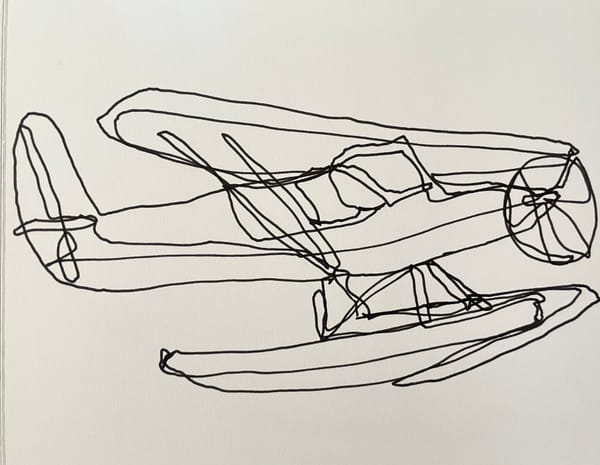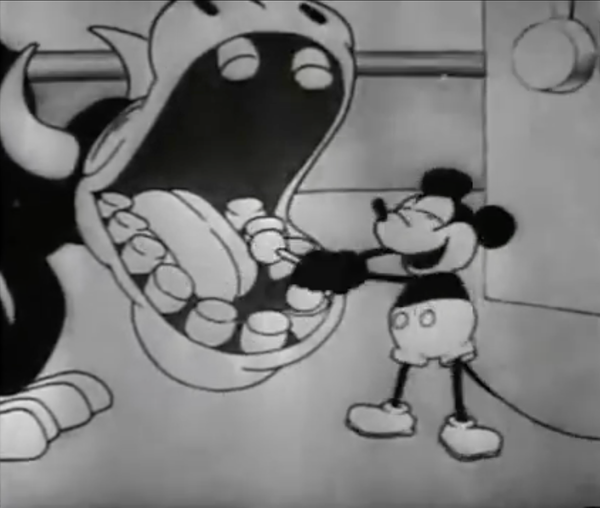The Business of Creativity
The Past
It's Saturday morning, you're hanging out with your pal Michelangelo. He's telling you about this new job, painting some ceiling. You think to yourself that seems like a bit of a backache, but you humor him. He then tells you how much dolla he's making, and that the Catholic Church is paying. You're suddenly a bit more interested. See, you've been painting all sorts since you joined the other men in the Tuesday night Renaissance club. Your other buddy, Leo, he's on a retainer to some wealthy family - the Medicis. They are lucky; life in the 17th century is not kind to the average artist.
In this make-believe, you don't age or die - which is a handy skill, because now you've got some new friends and the lads are pretty pleased with their gadgets: typewriters, printing presses and phonographs. Things are looking up for you; your art skills find some adjacent uses in host industries - you make layouts and cartoons for 'the man'.
But in the early 2000s, you get a break from the gatekeepers between the creative and the audience - and sell your skills direct to the consumer thanks to the internet. You make websites here and templates there, but finally sell some paintings thanks to eBay. You think to yourself, Leo would have loved this.
The Present
Eventually you catch up with time. And oh boy do you have options! Leo would lose his shit. You could sell your art, or you could just sell an idea of art - people will pay for your knowledge, your process, your insights. But most of the time, they won't even need to pay! Big tech will pick up the bill (with some T&Cs, avoiding eye contact and moral discussions).
It's a fantastical story - but the point is that in the history of creativity, there has never been a time with such strong business models supporting creative endeavours. I'll avoid talking about the ethics of the system that exists, and instead focus on the opportunity for creatives given that it does exist.
Trust: The New Currency
I've been watching (more than I had planned to) what people out there are up to. And the carpenter isn't selling woodwork, the photographer isn't selling photos, and the consultant isn't selling business advice. By showing off what they do, they're selling the idea of what they do. And when people buy into the idea of why you do something, they slowly start to become invested in the idea of you. Which is followed by connection and trust. The point at which trust is built, you can continue to sell ideas - or something else. There's a level of investment in the person that makes us more likely to support them than a 'stranger'.
If you followed the last post, in the not-much-of-a-plan, the plan hinges around building an audience - and expanding on that, particularly developing trust. Trust is becoming increasingly important online now more than ever with AI. For example, you trust I wrote this, which is important otherwise I suspect you would not read it. You thinking, "I wonder what Warwick has to say", is the core example of this trust economy in play.
To further make the point, we see an interesting shift in audience's choice of media, where independent creators have claimed huge stakes in the industry thanks to social platforms supporting it - and disrupting traditional media outlets. Look at the technology review space - Wired is arguably shadowed by YouTuber MKBHD. In independent journalism, individuals like Jonny Harris have larger audiences than some mid-size news outlets, and collectively they could give media firms a run for their prime time money. The original disruption is enabled by tech but the underlying disruption is a shift in trust. The huge price tag to these audience is down to the trust built. It's thinking, "I wonder what MKBHD has to say".
Trust is for all of us
Building trust is not something just for the YouTube mega stars. This works for individuals too. If you plan to sell anything at any point to anyone - a level of trust with a bunch of people outside of your immediate network will be key. We see so many musicians, authors, artists, entrepreneurs with equal skill and similar goods, but the ones who get ahead are the ones who build trust the fastest (the viral sensations are the outliers). Trust is the new currency of business.
With an audience who trusts you, the business opportunities are many. Let's assume Leo came with us to the future. Business options for Leo:
- Sell the audience - Advertisers want to reach people interested in art.
- Sell your product - People want to buy your art.
- Sell your ideas - People want your knowledge; courses, books, workshops etc.
- Sell your brand - Other brands may benefit from your association.
- Sell your persona - People want to associate themselves with you, host art meet-ups, or gallery viewing.
One-helluva-opportunity
We've moved from Michelangelo needing the Pope's approval to modern creators building direct relationships with thousands of people. The gatekeepers haven't disappeared - they've multiplied into millions of individual decision-makers. Each person choosing to follow, subscribe, or engage with your work is making a small bet on you. They're saying, "I trust this person to keep bringing me value."
This new economy - with all its flaws - is a massive opportunity for the everyday creative to figure out a life of sustained income through a specific or peculiar domain. The only catch is that it requires building trust with the new gatekeepers, and that's something that cannot happen if you solely focus on writing your book or recording that music. Whatever it is you have to offer to the world, now or in future, a bunch of relative strangers who trust you is an absolute unlock.
And news that would make Leo even more excited is that I believe the creatively inclined individual has a huge advantage in this space of trust and audience building. As I've learned over the course of this week, it requires a complex mix of skills - to have something to say, tell a story, perform and entertain, visually excite - it's the creative person's game for the taking. One-helluva opportunity indeed.
Until next week,
Warwick
--
PS: Know someone who this might just be what they need to hear? You can forward this email or send them to this link here! --> https://www.warwickvlantis.com/
--
Progress updates:
I managed to embarrass myself 5 times this week.
I made 3 short-form videos, my first YouTube video, and now this newsletter.
Current Stats:
Followers:
- Newsletter: 28
- YouTube: 13 (up 13 this week!)
- Instagram: 116
Monthly Income: $0


